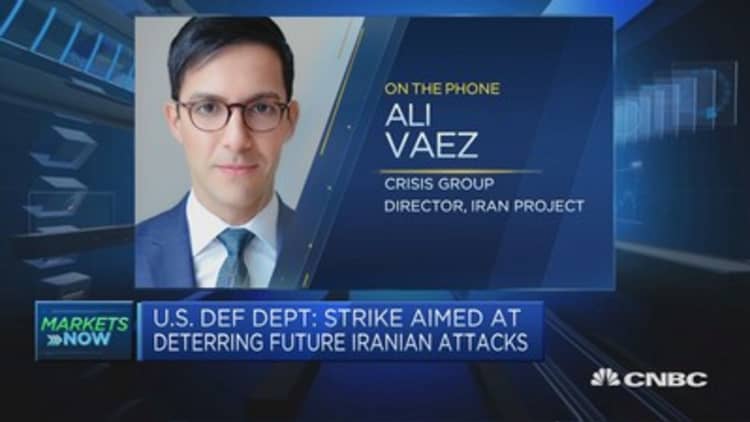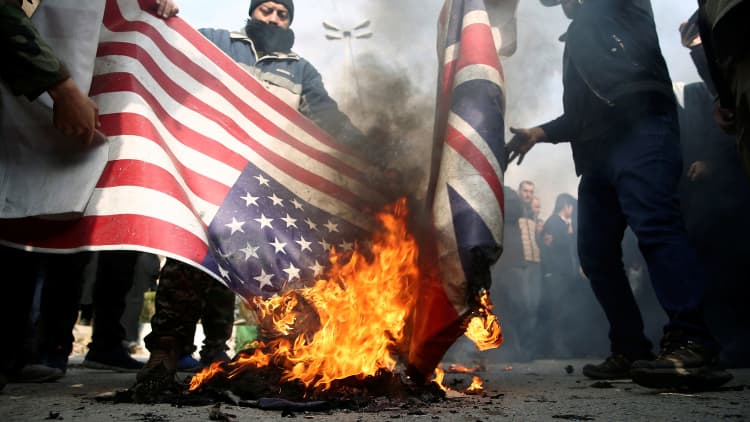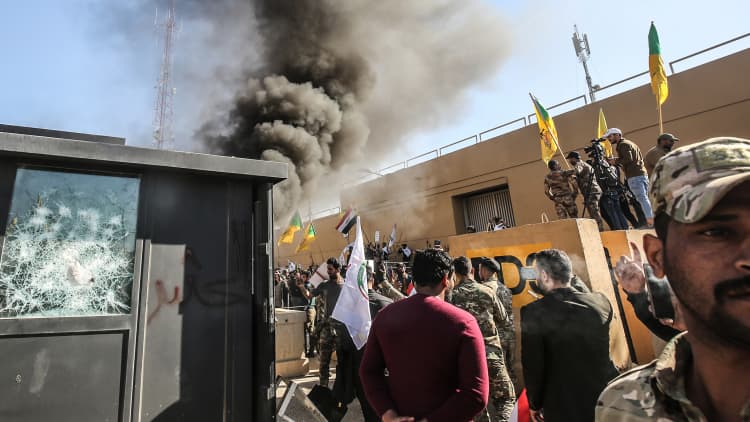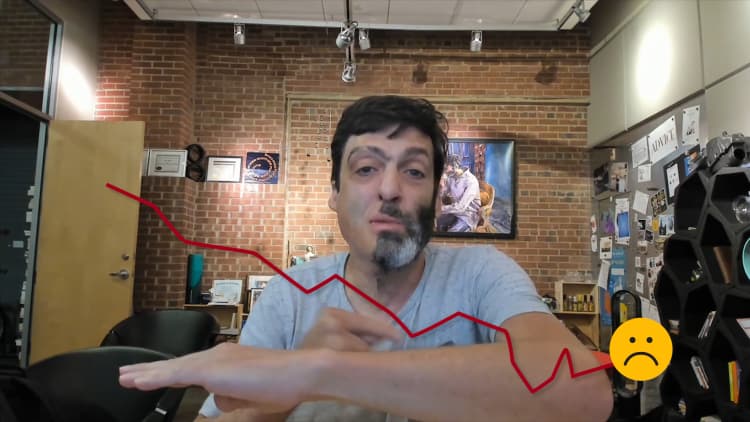
"Reckless," "a dangerous escalation," and "severe revenge": These are just a few of the words coming from international leaders and politicians in the wake of the U.S. killing of Maj. Gen. Qasem Soleimani, Iran's top military commander and the face of the Islamic Republic's interventions across the Middle East.
"A #SevereRevenge awaits the criminals who have stained their hands with his & the other martyrs' blood last night," Iranian Supreme Leader Ayatollah Ali Khamenei, the country's most powerful leader, wrote on Twitter on Friday morning. "Martyr Soleimani is an Intl figure of Resistance & all such people will seek revenge."
The Thursday night airstrike that killed Iran's most notorious military commander and spy, who headed the Islamic Revolutionary Guard Corps' Quds Force for more than 20 years, sent shockwaves through the Middle East and beyond. According to Phillip Smyth, a Shiite Islamist militarism expert and senior fellow at the Washington Institute, it's "the most major decapitation strike the U.S. has ever engaged in."

As tensions escalated, U.S. stocks fell Friday. Brent crude spiked as much as 4%, gold hit a four-month high, and the dollar fell to its lowest level in nine weeks. The State Department has ordered all American citizens in Iraq to leave the country immediately.
The U.S. had been pursuing the shadowy leader for decades. Soleimani was the face of Iran's military interventions overseas and what the U.S. government describes as the country's "malign activity," including training and deploying proxy fighters and supporting Bashar Assad in Syria, Hezbollah in Lebanon, the Houthi rebels in Yemen, and Shiite militias in Iraq. His operations within Iraq at the height of the Iraq war killed hundreds of U.S. personnel.
Since 2003, Iranian proxies in Iraq have killed more than 600 Americans, the State Department said last year.
The U.S. response to Soleimani's killing has been mixed, with a fair amount of criticism aimed at President Donald Trump from his Democratic opponents.
Former Vice President Joe Biden said overnight that Soleimani "deserved to be brought to justice for his crimes against American troops and thousands of innocents throughout the region." But the Democratic presidential frontrunner stopped short of praising the Trump administration and warned of adverse consequences, adding "this is a hugely escalatory move in an already dangerous region."
"President Trump just tossed a stick of dynamite into a tinderbox," Biden wrote.
Agnes Callamard, the United Nations' special rapporteur on extrajudicial executions, said in a post on Twitter that the killing of Suleimani "most likely" violated international law.
"Use of lethal force is only justified to protect against an imminent threat to life," Callamard wrote. Use of drones for targeted killings outside active hostilities was "almost never likely to be legal," she noted.
Vermont Sen. Bernie Sanders was also highly critical of the action. "Trump's dangerous escalation brings us closer to another disastrous war in the Middle East that could cost countless lives and trillions more dollars," he said in a statement. "Trump promised to end endless wars, but this action puts us on the path to another one."
The hit on the mastermind of Iran's foreign policy comes at a boiling point for U.S.-Iran tensions. It follows U.S. airstrikes in Iraq that killed 25 members of Kataib Hezbollah, an Iranian-backed Iraqi Shiite paramilitary group responsible for rocket strike that killed a U.S. contractor and other U.S. allies in northern Iraq in late December. The last week saw members of that militant group and others attack the U.S. embassy in Baghdad, many of whom chanted "Qasem Soleimani is our leader."

Even before that, 2019 was marked by successive escalations from both sides, including Washington's designation of the Revolutionary Guard Corps as a terrorist group, Iran's shooting down of a U.S. drone, intensifying U.S. sanctions on Tehran, attacks on oil tankers and Saudi Aramco facilities that have been blamed on Iran, and Tehran's incremental rolling back of its commitments to the Iranian nuclear deal after the U.S. ditched it in 2018.
Iranian President Hassan Rouhani wrote on Twitter on Friday morning: "The path of resistance to US excesses will continue. The great nation of Iran will take revenge for this heinous crime."
Iraqi Prime Minister Adel Abdul-Mahdi also condemned the "assassination" — which was carried out in Baghdad — calling it "an act of aggression on Iraq" and "breach of sovereignty that will lead to war in Iraq, the region, and the world."
Hassan Nasrallah, the leader of Lebanon's Hezbollah, the small country's most powerful Shiite political and militant entity, vowed Friday to "continue the path" of the Iranian general and described the punishment of the U.S. as a responsibility of all Hezbollah fighters.
Saudi Arabia in a statement called for "self-restraint" and said the "international community must fulfill its responsibilities to take the necessary measures to ensure the security and stability of this vital region for the whole world."

Outside the region, world leaders raised concerns about the possibility of an escalation of the conflict in the Middle East. Dominic Raab, the U.K. foreign secretary, said in a statement, "We have always recognised the aggressive threat posed by the Iranian Quds force led by Qasem Soleimani. Following his death, we urge all parties to de-escalate. Further conflict is in none of our interests."
Charles Michel, president of the European Council, issued a similar statement: "The cycle of violence, provocations and retaliations which we have witnessed in #Iraq over the past weeks has to stop. Further escalation must be avoided at all cost."
The rapid developments of the last week now put the spotlight on potential retaliatory moves from Iran as well as next steps for Trump, who ran much of his campaign — and continues to do so ahead of the 2020 election — on the promise of an end to Middle East wars. For some watching the situation unfold, after Thursday's attack, the president may not have a choice but to continue.
Massachusetts Sen. Elizabeth Warren, another Democratic presidential candidate, criticized the killing despite describing Soleimani as a "murderer" and noting his responsibility for "the deaths of thousands, including hundreds of Americans."
But she added in a tweet: "This reckless move escalates the situation with Iran and increases the likelihood of more deaths."
Minnesota Sen. Amy Klobuchar, also a Democratic presidential contender, tweeted early Friday: "Qasem Soleimani was responsible for directing Iran's destabilizing actions in Iraq, Syria, and throughout the Middle East, including attacks against U.S. forces. But the timing, manner, and potential consequences of the Administration's actions raise serious questions and concerns about an escalating conflict."



